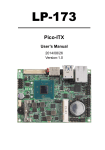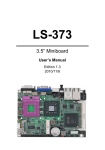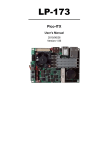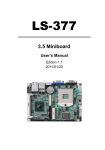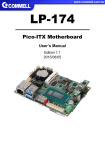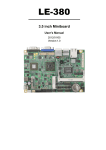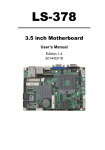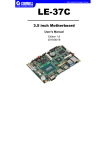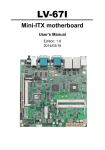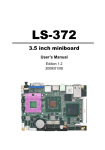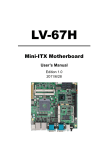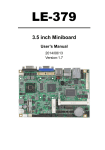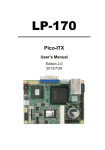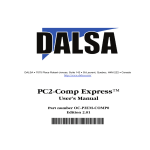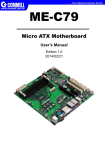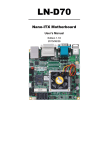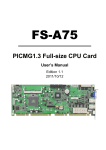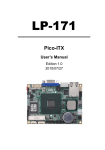Download User`s manual
Transcript
LP-172 Pico-ITX User’s Manual 2014/3/14 Version:1.7 LP-172 User’s Manual Copyright Copyright 2012. All rights reserved. This document is copyrighted and all rights are reserved. The information in this document is subject to change without prior notice to make improvements to the products. This document contains proprietary information and protected by copyright. No part of this document may be reproduced, copied, or translated in any form or any means without prior written permission of the manufacturer. All trademarks and/or registered trademarks contains in this document are property of their respective owners. Disclaimer The company shall not be liable for any incidental or consequential damages resulting from the performance or use of this product. The company does not issue a warranty of any kind, express or implied, including without limitation implied warranties of merchantability or fitness for a particular purpose. The company has the right to revise the manual or include changes in the specifications of the product described within it at any time without notice and without obligation to notify any person of such revision or changes. Trademark All trademarks are the property of their respective holders. Any questions please visit our website at http://www.commell.com.tw TU -1- UT LP-172 User’s Manual Packing List: Please check the package content before you starting using the board. Hardware: LP-172 Pico-ITX Miniboard x 1 Cable Kit: USB Cable x 1 SATA Cable x 1 (OALUSBA-3)/ (1040173) (OALSATA22B-PM15SH15)/ (1040512) DC_IN Power Cable x 1 (OALDC-B)/ (1040513) Dual COM PORT cable OALES-BKU2NB)/ (1040090) Audio Cable x 1 PS/2 keyboard & mouse cable x 1 (OALPJ-HDUNB)/ (1040123) (OALPS2/MKN)/ (1040551) LP-172N Heatsink x 1 LP-172D5 Heatsink with Fan x 1 (OHS-172)/ (2181110001) (OHS-172F)/ (2181010013) Printed Matters: Driver CD x 1 (Including User’s Manual) -2- LP-172 User’s Manual Index Chapter 1 <Introduction> .............................................................6 1.1 <Product Overview> ...............................................................................6 1.2 <Product Specification>..........................................................................7 1.3 <Mechanical Drawing> ...........................................................................9 1.4 <Block Diagram> ..................................................................................10 Chapter 2 <Hardware Setup> .................................................. 11 2.1 <Connector Location> .......................................................................... 11 2.2 <Jumper Reference>............................................................................13 2.3 <Connector Reference> .......................................................................14 2.3.1 <Internal Connector>...........................................................14 2.3.2 <External Connector> .........................................................14 2.4 <Memory Setup> ..................................................................................15 2.5 <CMOS & ATX Setup>.........................................................................16 2.6 <SATA Interface> .................................................................................17 2.7 <LAN Interface> ...................................................................................18 2.8 <Onboard Display Interface> ...............................................................19 2.8.1 <Analog VGA Interface> .....................................................19 2.8.2 <CN_LVDS> ........................................................................20 2.9 <Onboard Audio Interface> ..................................................................24 2.10 <USB2.0 Interface> ............................................................................25 2.11 <Serial Port Jumper Setting > ............................................................26 2.12 <Power & FAN Connector >...............................................................27 2.12.1 <Power Input> ...................................................................27 2.12.2 <Power Output> ................................................................28 2.12.3 <Fan Connector> ..............................................................29 2.13 <Indicator and Switch> .......................................................................30 Chapter 3 <BIOS Setup> ............................................................32 Appendix A <I/O Port Pin Assignment>..........................34 A.1 <SATA Port> ........................................................................................34 -3- LP-172 User’s Manual A.2 <CRT Port> ..........................................................................................34 A.3 <LAN Port> ..........................................................................................34 A.4 <LAN LED Port> ..................................................................................35 A.5 <LPC Port> ..........................................................................................35 Appendix B <Flash BIOS>.........................................................36 B.1 BIOS Auto Flash Tool ...........................................................................36 B.2 Flash Method .......................................................................................36 Appendix C <System Resources> ......................................37 C.1 <I/O Port Address Map> ......................................................................37 C.2 <Memory Address Map>......................................................................39 C.3 <System IRQ Resources> ...................................................................40 Appendix D <Watch Dog timer Setting> .........................43 Contact Information .......................................................................45 -4- LP-172 User’s Manual (This page is left for blank) -5- LP-172 User’s Manual Chapter 1 <Introduction> 1.1 <Product Overview> LP-172 is the PICO-ITX miniboard with Intel® Atom™ CedarTrail Processor with optional D2550 or N2800 platform, Intel® NM10, integrated Intel® GMA 3650 graphics, DDR3 SO-DIMM memory, Realtek ALC888 HD Codec audio and one Intel® 82583V Giga LAN. Intel® Atom D2550 Processor The Intel® Atom D2550 Dual core processor is with, 1.86GHz clock Speed, 1MB L2 cache. It's built on 32nm process technology support Hyper-Threading Technology, Intel® 64. Intel® Atom N2800 Processor The Intel® Atom N2800 Dual core processor is with, 1.86GHz clock Speed, 1MB L2 cache. It's built on 32nm process technology support Hyper-Threading Technology, Enhanced Intel Speedstep® Technology, Intel® 64. Intel® NM10 Chipset The board integrates Intel® NM10. The chipset features power-efficient graphics with an integrated 32-bit 3D graphics engine based on Intel® Graphics Media Accelerator 3650 architecture with DVI, LVDS, CRT display ports. It provides I/O capabilities and flexibility via high-bandwidth interfaces such as PCIE and Hi-Speed USB 2.0 connectivity. It also includes a single channel for 1066 MHz DDR3 system memory (SODIMM), HD Audio. Flexible Extension Interface The board also provides one Mini card socket. -6- LP-172 User’s Manual 1.2 <Product Specification> General Specification Form Factor CPU Memory Chipset Watchdog Timer Real Time Clock Serial ATA PICO-ITX miniboard Intel® Atom™ CedarTrail Processor with optional D2550 or N2800 1 x 204-pin DDR3 800/1066 SO-DIMM SDRAM up to 4G Intel® NM10 System reset programmable watchdog timer with 1 ~ 255 sec./min. of timeout value Chipset integrated RTC with onboard lithium battery 1 x serial ATAII interface with 300MB/s transfer rate (No RAID Function) Multi-I/O Port Chipset Serial Port USB Port K/B & Mouse Winbond W83627DHG-P Two RS-232 serial port Four Hi-Speed USB 2.0 ports with 480Mbps of transfer rate PS/2 keyboard and mouse port VGA Display Interface Chipset Display Type Connector Intel® integrated extreme GMA 3650 CRT, LCD monitor with analog display, single channel LVDS External DB15 female connector Onboard 20-Pin LVDS and 5-Pin inverter connector Ethernet Interface Controller Type Connector 1 x Intel® 82583V Gigabit Ethernet controller Triple speed 10/100/1000Base-T auto-switching Fast Ethernet Full duplex, IEEE802.3U compliant 1 X External RJ45 connector with LED Audio Interface Chipset REALTEK ALC888 Interface Stereo audio Line-out and MIC-in Connector Onboard audio connector with pin header Expansive Interface PCIE Mini Card 1 x PCIE Mini Card socket Power and Environment Power Requirement Dimension Temperature DC only +5V input with onboard 2-pin connector 100 (L) x 72(H) mm Operating within 0 ~ 60℃ Storage within -20 ~ 85℃ -7- LP-172 User’s Manual Ordering Code LP-172D5 LP-172D5S LP-172N LP-172NS Support Intel® Atom™ CedarTrail D2550 processor with onboard VGA, 18 or 24 bit LVDS, Audio, Giga LAN, USB2.0 .SATAII, PCIE mini card Support Intel® Atom™ CedarTrail D2550 processor with onboard VGA, 18 or 24 bit LVDS, Audio, Giga LAN, USB2.0 .SATAII, PCIE mini card mSATA Support Intel® Atom™ CedarTrail N2800 processor with onboard VGA, 18 bit LVDS, Audio, Giga LAN, USB2.0 .SATAII, PCIE mini card Support Intel® Atom™ CedarTrail N2800 processor with onboard VGA, 18 bit LVDS, Audio, Giga LAN, USB2.0 .SATAII, PCIE mini card mSATA The specifications may be different as the actual production. For further product information please visit the website at http://www.commell.com.tw TU -8- UT LP-172 User’s Manual 1.3 <Mechanical Drawing> -9 - LP-172 User’s Manual 1.4 <Block Diagram> Intel Atom CRT / LVDS DDR3 SO-DIMM 4GB max. D2550/N2800 PCIE Mini card HD Audio Intel 4 x USB port NM10 Giga LAN 1 x SATA PS2 KB/MS W83627DHG-P -10- 2 x Serial Port LP-172 User’s Manual Chapter 2 <Hardware Setup> 2.1 <Connector Location> CPUFAN CN_LVDS CN_COM1/2 JFRNT CN_SATA DC_IN CN_USB1 SYSFAN CN_LPC MINI_CARD CN_USB2 CN AUDIO -11- LP-172 User’s Manual CN_INV DC_OUT SO-DIMM LP-172 RJ45 PS2 CRT -12- LP-172 User’s Manual 2.2 <Jumper Reference> Jumper JRTC JAT JVLCD Function CMOS Operating/Clear Setting AT/ATX Mode Setting LCD Panel Voltage Setting JVLCD JRTC JAT -13- LP-172 User’s Manual 2.3 <Connector Reference> 2.3.1 <Internal Connector> Connector SO-DIMM CN_SATA MINI_CARD CN_INV CN_USB1/2 CN_AUDIO CN_LPC CN_COM1/2 JFRNT CPUFAN SYSFAN DC_OUT DC_IN Function 204 -pin DDR3 SO-DIMM SDRAM slot 10-pin SATA Cable connector PCIE mini card socket 5-pin LCD inverter connector 5 x 2-pin USB connector 5 x 2-pin audio connector 5 x 2-pin header for LPC Port 10 x 2-pin com connector 10-pin switch/indicator connector 4-pin CPU cooler fan connector 3-pin system cooler fan connector 6-pin power output connector DC input connector Remark 2.3.2 <External Connector> Connector CRT PS2 RJ45 Function DB15 VGA connector PS/2 keyboard and mouse connector RJ45 LAN connector -14- Remark LP-172 User’s Manual 2.4 <Memory Setup> Non-ECC, unbuffered memory is supported only. The board provides one 204-pin DDR3 SO-DIMM to support DDR3 800/1066 memory modules up to 4GB. Suggestion: DDR3 SO-DIMM Modules: –Raw Card C = Single-sided x 8 –Raw Card F = Double-sided x 8 SO-DIMM -15- LP-172 User’s Manual 2.5 <CMOS & ATX Setup> The board’s data of CMOS can be setting in BIOS. If the board refuses to boot due to inappropriate CMOS settings, please remove battery to clear (reset) the CMOS to its default values. 3 1 JAT JRTC 3 1 Battery The board has a jumper to switch AT power mode (automatic power on) or standard ATX mode. Jumper: JAT Type: onboard 3-pin jumper JAT 1-2 2-3 Default setting Mode AT Mode ATX Mode Jumper: JRTC Type: onboard 3-pin jumper JRTC 1-2 2-3 Default setting Mode Clear CMOS Normal Operation -16- LP-172 User’s Manual 2.6 <SATA Interface> Based on Intel NM10, the board provides one Serial ATAII interfaces with up to 300MB/s of transfer rate. CN_SATA DC_OUT -17- LP-172 User’s Manual 2.7 <LAN Interface> The Intel® 82583V supports triple speed of 10/100/1000Base-T, with IEEE802.3 compliance and Wake-On-LAN supported. LAN -18- LP-172 User’s Manual 2.8 <Onboard Display Interface> Based on Intel Atom CedarTrail Processor chipset with built-in Intel® integrated extreme GMA 3650, the board provides one DB15 connector on real external I/O port, and LVDS interface with 5-pin LCD backlight inverter connector. The board provides dual display function with clone mode and extended desktop mode for CRT and LVDS. 2.8.1 <Analog VGA Interface> Please connect your CRT or LCD monitor with DB15 male connector to the onboard DB15 female connector on rear I/O port. The board supports up to 1920 x 1080 (WUXGA) of resolution. CRT -19- LP-172 User’s Manual 2.8.2 <CN_LVDS> The board provides one 20-pin LVDS connector for 18 bit or 24bit single channel panel, with one LCD backlight inverter connector and one jumper for panel voltage setting. 20 2 CN_LVDS 1 19 3 1 JVLCD 1 CN_INV 5 -20- LP-172 User’s Manual Connector: CN_INV Type: 5-pin Inverter power connector Connector model: molex_53261-5pin or compatible Pin 1 2 3 4 5 Description +3.3V CTLBKL +5V GND Enable Jumper: JVLCD Type: 3-pin Power select jumper Pin Description 1-2 +5V 2-3 +3.3V Default: 2-3 Connector: CN_LVDS Type: onboard 20-pin connector for LVDS connector Connector model: E&T 3950-B20C-00R or similar (HIROSE DF13-20DP-1.25V compatible) Pin 1 3 5 7 9 11 13 15 17 19 Signal LCDVCC NC TX0N GND TX1P TX2N GND TXCP TXL3N (LP-172D5) NC Pin 2 4 6 8 10 12 14 16 18 20 -21- Signal LCDVCC GND TX0P TX1N GND TX2P TXCN GND TXL3P (LP-172D5) NC LP-172 User’s Manual To setup the LCD, you need the component below: 1. A panel with LVDS interfaces. 2. An inverter for panel’s backlight power. 3. A LCD cable and an inverter cable. For the cables, please follow the pin assignment of the connector to make a cable, because every panel has its own pin assignment, so we do not provide a standard cable; please find a local cable manufacture to make cables. LCD Installation Guide: 1. Preparing the LP-172, LCD panel and the backlight inverter 2. You would need a LVDS type cable. Panel side Board side For sample illustrator only 3. To connect all of the devices well. -22- LP-172 User’s Manual After setup the devices well, you need to select the LCD panel type in the BIOS. The panel type mapping is list below: LP-172 BIOS panel type selection form On board Single channel LVDS 18bit (LP-172N) 24bit (LP-172D5) NO. Output format Output format 1 640 x 480 640 x 480 2 800 x 600 800 x 600 3 1024 x 768 1024 x 768 4 1280 x 1024 1280 x 1024 5 1366 x 768 1366 x 768 6 1280 x 800 1280 x 800 -23- LP-172 User’s Manual 2.9 <Onboard Audio Interface> The board provides the onboard high definition audio with Realtek ALC888 Connector: CN_AUDIO Type: 10-pin (2 x 5) 1.27mm x 2.54mm-pitch header Pin Description Pin Description 1 MIC2_L 2 AGND 3 MIC2_R 4 AVCC 5 FP_OUT_R 6 MIC2_JD 7 SENSE_B 8 N/C 9 FP_OUT_L 10 LINE2_JD 2 10 1 9 CN_AUDIO -24- LP-172 User’s Manual 2.10 <USB2.0 Interface> Based on Intel® NM10 FCH, the board provides 4 USB2.0 ports. The USB2.0 interface provides up to 480Mbps of transferring rate. Interface USB2.0 Controller NM10 Transfer Rate Up to 480Mb/s Output Current 500mA 10 9 2 1 CN_USB1 2 10 CN_USB2 1 Connector: CN_USB Type: 10-pin (5 x 2) header for USB Port Pin Description Pin 1 VCC 2 3 Data04 5 Data0+ 6 7 Ground 8 9 Ground 10 9 Description VCC Data1Data1+ Ground N/C PS: The USB2.0 will be only active when you connecting with the USB2.0 devices, if you insert an USB1.1 device, the port will be changed to USB1.1 protocol automatically. The transferring rate of USB2.0 as 480Mbps is depends on device capacity, exact transferring rate may not be up to 480Mbps. -25- LP-172 User’s Manual 2.11 <Serial Port Jumper Setting > The board provides two RS232 serial ports Connector: CN_COM1/2 Type: 20-pin (5 x 2) 1.27mm x 2.54mm-pitch header for COM1/2 Pin 1 3 5 7 9 11 13 15 17 19 Description MDCD1MSO1N/C MRTS1MRI1MDCD2MSO2GND MRTS2MRI2- Pin 2 4 6 8 10 12 14 16 18 20 -26- Description MSIN1MDTR1MDSR1MCTS1N/C MSIN2MDTR2MDSR2MCTS2N/C 20 19 2 1 LP-172 User’s Manual 2.12 <Power & FAN Connector > The board requires DC input with 2-pin header, the input voltage range is from 5V for the input current, please take a reference of the power consumption report on appendix. 2.12.1 <Power Input> Connector: DC_IN Type: 2-pin header Pin Description 1 Ground Pin 2 Remark: DC input voltage only +5V 2 1 DC_IN -27- Description +5V LP-172 User’s Manual 2.12.2 <Power Output> Connector: DC_OUT Type: 6-pin connector for +5V output Pin Description Pin Description Pin Description 1 N/C 2 N/C 3 Ground 4 Ground 5 +5V 6 +5V Note: Maximum output current 5V/1A DC_OUT 1 6 -28- LP-172 User’s Manual 2.12.3 <Fan Connector> Connector: SYSFAN Type: 3-pin fan wafer connector Connector model: 2001-WS-03-LF Pin 1 Description Ground Pin 2 Description +5V Connector: CPUFAN Type: 3-pin fan wafer connector Connector model: 2001-WS-03-LF Pin Description 1 Ground 2 +5V 3 P1FAN 3 CPUFAN 1 3 SYSFAN 1 -29- Pin 3 Description CSFAN LP-172 User’s Manual 2.13 <Indicator and Switch> The JFRNT provides front control panel of the board, such as power button, reset and beeper, etc. Please check well before you connecting the cables on the chassis. Connector: JFRNT Type: onboard 10-pin (2 x 5) 2.54-pitch header Function Signal PIN Signal PWRBT- 1 2 PWRBT+ Speaker SPK- 3 4 SPK+ HDD LED HLED- 5 6 HLED+ GND 7 8 PWLED+ Reset- 9 10 GND Power Power LED Reset 10 9 2 1 JFRNT -30- LP-172 User’s Manual (This Page is Left For Blank) -31- LP-172 User’s Manual Chapter 3 <BIOS Setup> The motherboard uses the Phoenix BIOS for the system configuration. The Phoenix BIOS in the single board computer is a customized version of the industrial standard BIOS for IBM PC AT-compatible computers. It supports Intel® x86 and compatible CPU architecture based processors and computers. The BIOS provides critical low-level support for the system central processing, memory and I/O sub-systems. The BIOS setup program of the single board computer let the customers modify the basic configuration setting. The settings are stored in a dedicated battery-backed memory, NVRAM, retains the information when the power is turned off. If the battery runs out of the power, then the settings of BIOS will come back to the default setting. The BIOS section of the manual is subject to change without notice and is provided here for reference purpose only. The settings and configurations of the BIOS are current at the time of print, and therefore they may not be exactly the same as that displayed on your screen. To activate CMOS Setup program, press <DEL> key immediately after you turn on the system. The following message “Press DEL to enter SETUP” should appear in the lower left hand corner of your screen. When you enter the CMOS Setup Utility, the Main Menu will be displayed as Figure 4-1. You can use arrow keys to select your function, press <Enter> key to accept the selection and enter the sub-menu. Figure 4-1 CMOS Setup Utility Main Screen -32- LP-172 User’s Manual (This Page is Left for Blank) -33- LP-172 User’s Manual Appendix A <I/O Port Pin Assignment> A.1 <SATA Port> 1 Connector: SATA 10 Type: 10-pin header for SATA Port Pin 1 3 5 7 9 Description Ground TXN N/C Ground RXP Pin 2 4 6 8 10 Description TXP Ground N/C RXN Ground A.2 <CRT Port> Connector: CRT Type: 15-pin D-sub female connector on rear panel 5 1 10 6 15 Pin 1 2 3 4 5 Description RED GREEN BLUE N/C -CRTATCH Pin 6 7 8 9 10 Description Ground N/C Ground LVGA5V -CRTATCH Pin 11 12 13 14 15 11 Description N/C 5VCDA HSYNC VSYNC 5VCLK A.3 <LAN Port> Connector: RJ45 Type: RJ45 connector with LED on rear panel 8 1 Pin 1 2 3 4 5 6 7 8 Description TRD0+ TRD0- TRD1+ TRD2+ TRD2- TRD1- TRD3+ TRD3- -34- LP-172 User’s Manual A.4 <LAN LED Port> Connector: JSPD1 Type: 2-pin header for LAN Speed LED connector RJ45 connector with LED on rear panel When Lan speed 10/100Mbps Pin 1 2 Description LEDLED+ When Lan speed 1Gbps Pin 1 2 2 1 Description LED+ LED- Connector: JACT Type: 5-pin header for LAN Activity LED connector Pin 1 2 Description LEDLED+ 2 1 A.5 <LPC Port> Connector: JSPD1 Type: 10-pin header for LPC Port Pin 1 3 5 7 9 Description LPC_CLK LFRAMELAD2 LAD0 Ground Pin 2 4 6 8 10 -35- Description RESETLAD3 LAD1 +3.3V Ground 10 9 2 1 LP-172 User’s Manual Appendix B <Flash BIOS> B.1 BIOS Auto Flash Tool The board is based on phoenix BIOS and can be updated easily by the BIOS auto flash tool. You can download the tool online at the address below: http://www.phoenix.com/en/home/ http://www.commell.com.tw/Support/Support_SBC.htm File name of the tool is “Pflash.exe”, it’s the utility that can write the data into the BIOS flash ship and update the BIOS. B.2 Flash Method 1. Please make a bootable floppy disk. 2. Get the last .bin files you want to update and copy it into the disk. 3. Copy awardflash.exe to the disk. 4. Power on the system and flash the BIOS. (Example: C:/Pflash /sa /bbl /cvar XXX.bin) 5. Re-star the system. Any question about the BIOS re-flash please contact your distributors or visit the web-site at below: http://www.commell.com.tw/support/support.htm -36- LP-172 User’s Manual Appendix C <System Resources> C.1 <I/O Port Address Map> -37- LP-172 User’s Manual -38- LP-172 User’s Manual C.2 <Memory Address Map> -39- LP-172 User’s Manual C.3 <System IRQ Resources> -40- LP-172 User’s Manual -41- LP-172 User’s Manual -42- LP-172 User’s Manual Appendix D <Watch Dog timer Setting> The watchdog timer makes the system auto-reset while it stops to work for a period. The integrated watchdog timer can be setup as system reset mode by program. Timeout Value Range - 1 to 255 - Second or Minute Program Sample Watchdog timer setup as system reset with 5 second of timeout O 2E 87 O 2E 87 O 2E 07 O 2F 08 Logical Device 8 O 2E 30 O 2F 01 Activate O 2E F5 O 2F 02 Set as Second* O 2E F6 O 2F 05 Set as 5 * Minute: bit 3 = 1; Second: bit 3 = 0 You can select Timer setting in the BIOS, after setting the time options, the system will reset according to the period of your selection. -43- LP-172 User’s Manual This Page is Left for Blank) -44- LP-172 User’s Manual Contact Information Any advice or comment about our products and service, or anything we can help you please don’t hesitate to contact with us. We will do our best to support you for your products, projects and business. Taiwan Commate Computer Inc. Address 19F., No.94, Sec. 1, Xintai 5th Rd., Xizhi Dist., New Taipei City 22102, Taiwan TEL +886-2-26963909 FAX +886-2-26963911 http://www.commell.com.tw Website TU UT [email protected] (General Information) TU UT E-Mail [email protected] (Technical Support) TU Facebook Twitter UT https://www.facebook.com/pages/Taiwan-Commate-Computer-Inc/547993955271899 https://twitter.com/Taiwan_Commate Commell is our trademark of industrial PC division -45-














































